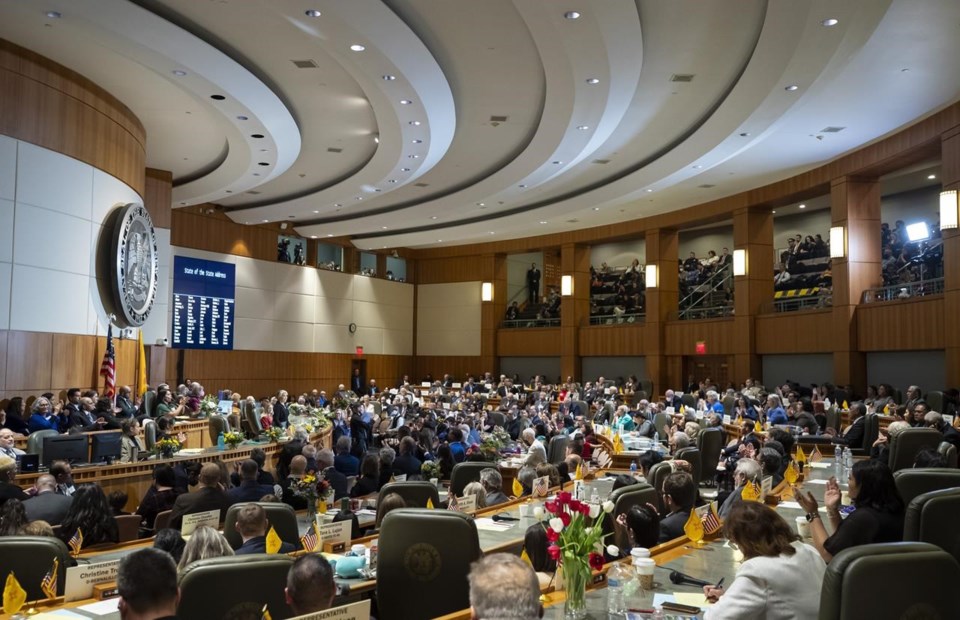SANTA FE, N.M. (AP) — A standoff over abortion in politically conservative regions of New Mexico escalated Friday as Democratic state legislators advanced a bill that would prohibit local governments from interfering with women's access to reproductive health care.
The initiative from state House Democrats responds to abortion restrictions recently adopted in two counties and three cities in eastern New Mexico where sentiments against the procedure run deep — and amid efforts by states across the nation to restrict abortion following the U.S. Supreme Court's ruling overturning Roe v. Wade.
A legislative panel endorsed the bill on a party-line, 7-3 vote with opposition from Republican lawmakers who said they were bombarded with emails, phone calls and petitions from constituents in opposition. Additional hearings are planned before the House and Senate potentially votes on the bill, which is supported by Democratic Gov. Michelle Lujan Grisham.
Anti-abortion ordinances, adopted over the past several months by officials in the cities of Hobbs, Clovis, Eunice, and Lea and Roosevelt counties, reference an obscure U.S. anti-obscenity law that prohibits shipping of medication or other materials intended to aid abortions.
State Attorney General Raúl Torrez says local governments have overstepped their authority to regulate health care access, with local laws that violate state constitutional guarantees of equal protection and due process. Last month, Torrez petitioned the state Supreme Court to intervene. The court has yet to respond.
The new bill, sponsored by Rep. Linda Serrato of Santa Fe and other Democrats, would prohibit local governments from interfering with access to reproductive care — including abortion, birth control, and prevention of or treatment for sexually transmitted diseases.
“It's really important ... to make it abundantly clear to everyone that in New Mexico you can access health care and we respect your ability to do so," Serrato said.
The bill would also ban local restrictions on gender-affirming care, which typically can include puberty-blocking medication, hormone therapy or surgeries. That provision is a counterpoint to proposed bans on gender-affirming care for minors or young adults in more than two dozen states.
“We've seen so many, to be frank, politically motivated attacks on these two types of health care," Serrato told The Associated Press. “We wanted to make sure that people were not scared of accessing their health care.”
On Friday, Serrato told a House panel that providing gender-affirming health care can save lives by lowering suicide rates and addressing depression as youths come of age and grapple with questions of gender. Republican state Rep. Harlan Vincent, of Ruidoso Downs, countered that a portion of youths have regrets after seeking gender-affirming health care.
Jodi Hendricks, executive director of the conservative group New Mexico Family Action Movement, described abortion and gender-affirming care as “elective procedures” and urged legislators to leave room for conscience decisions and support the autonomy of local government.
“We do not believe that local governments and bodies should lose the right to determine what's best with their communities," she said.
In 2021, New Mexico's Democrat-led Legislature passed a measure to repeal a dormant 1969 statute that outlawed most abortion procedures, ensuring access to abortion after the U.S. Supreme Court overturned Roe v. Wade last year in the Dobbs v. Jackson Women’s Health Organization case.
But that ruling last June also energized local government efforts to restrict abortion.
Hobbs Mayor Sam Cobb has said constituents in his community overwhelmingly support the city’s abortion-restricting ordinance, citing hours of public testimony to the city council.
The ordinances adopted in New Mexico bear hallmarks of a national effort to ban abortion one city at a time led by Mark Lee Dickson, founder of the Texas-based Sanctuary Cities of the Unborn organization. He has traveled extensively in New Mexico to talk to local government boards and faith-based groups.
“The approach in New Mexico ended up being compliance with these federal statutes,” Dickson told the AP. “They're not explicit abortion bans ... but they have the same result. We call them de facto abortion bans."
Dickson said he envisions the ordinances in New Mexico holding up to scrutiny in federal court and helping cities such as Hobbs keep at bay abortion providers and pharmacy chain distributors of abortion pills, amid legal battles over state restrictions on abortion medications.
“I almost want to show up and say (to state legislators), ‘I double dog dare you to pass it,’” said Dickson, who believes local abortion ordinances are reinforced by federal law and can't be overturned by the Legislature.
Roosevelt County’s ordinance gives private citizens the power to sue anyone suspected of violations of local regulation of abortion, allowing damages of up to $100,000 per infraction.
Under the state bill, interference with reproductive and gender-affirming health care could result in civil penalties of up to $5,000, damage awards and compensation for legal expenses.
Minnesota on Tuesday became the first state Legislature this year to codify abortion rights into law, ensuring that the state’s existing protections remain in place no matter who sits on future courts.
Morgan Lee, The Associated Press



